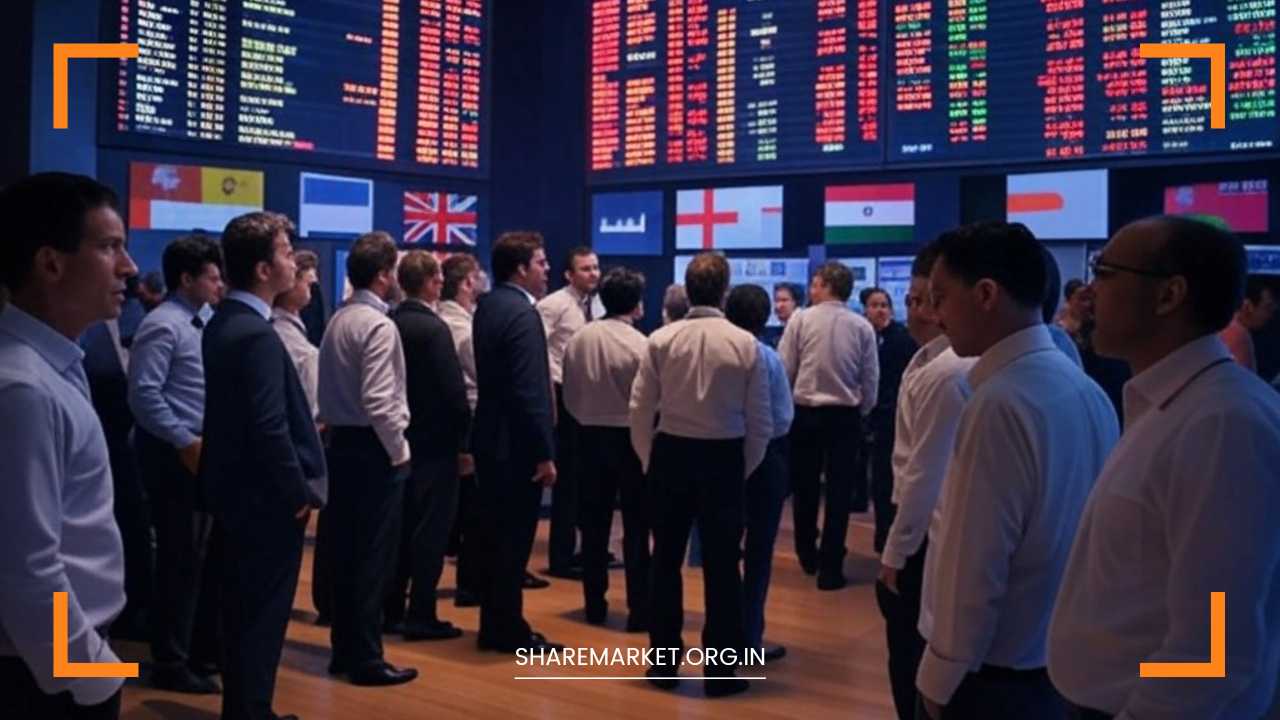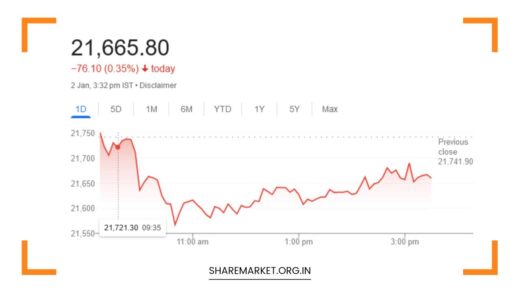Stock Market Crash: Rs 10 Lakh Crore Lost as Sensex Drops 930 Points Amid Global Trade Tensions

Stock Market Crash
Stock Market Crash: ₹10 Lakh Crore Vanishes as Sensex Dips by 930 Points, Investors Face Huge Losses
Stock Market Update: The Indian stock market saw a dramatic and unsettling decline today, with the total market capitalization of companies listed on the Bombay Stock Exchange (BSE) plummeting to ₹403.55 lakh crore, reflecting a massive loss of ₹9.78 lakh crore in just one trading session.
April 4, 2025, proved to be another painful day for Indian investors, as stock markets closed lower for the second consecutive day.
Both the BSE Sensex and the NSE Nifty ended the day with substantial losses, shedding more than 1 percent of their value.
The plunge was triggered by renewed fears of a global trade war following recent tariff announcements by former U.S. President Donald Trump, which further escalated tensions between the world’s largest economies.
This heightened sense of uncertainty and anxiety caused widespread panic in the stock market, with investors scrambling to sell off their holdings.
The damage was most apparent in smallcap and midcap stocks, where losses were exacerbated by speculative trading and a general lack of investor confidence.
Both the BSE Midcap and Smallcap indices fell by more than 3 percent, amplifying the already significant losses across the broader market.
The crash was further exacerbated by weakness across various sectors, including IT, Pharma, Energy, Commodities, Capital Goods, and Realty.
The cumulative result was a staggering ₹10 lakh crore erosion of wealth from the stock market today. In light of the market’s dismal performance, investors are grappling with significant financial setbacks, as the Indian stock market faced its worst day in months.
The Scale of the Decline: ₹9.78 Lakh Crore Wiped Out
By the time trading closed, the total market capitalization of companies listed on the BSE had dropped from ₹413.33 lakh crore on April 3, 2025, to ₹403.55 lakh crore today.
This sharp decline of ₹9.78 lakh crore equates to a significant loss of investor wealth, particularly when considering the cumulative impact on individual investors, institutions, and mutual funds.
The fall in market cap reflects the broader vulnerability of the stock market to global economic and geopolitical developments, as well as domestic challenges such as inflationary pressures and tightening monetary policies.
This massive reduction in market value is an ominous sign, particularly in a market where investors were already contending with volatility in global markets, a slowing economy, and rising inflation.
It underscores the fragility of investor sentiment and the extent to which external factors can influence the Indian stock market, which has often been seen as one of the more resilient emerging markets in recent years.
A Chilling Global Influence: Trump’s Tariff Announcements
The biggest catalyst for today’s stock market crash was the unexpected tariff announcements by former U.S. President Donald Trump.
These announcements have rekindled fears of a global trade war, which could result in severe economic consequences for not just the U.S. and China, but for countries around the world.
Global trade tensions have a direct impact on the Indian economy, given that India is deeply integrated into the global supply chain.
The market reacted negatively to the news, with many investors fearing that this development could lead to rising protectionism, escalating trade barriers, and a slowdown in global trade.
These uncertainties are making it difficult for investors to assess the future earnings of companies, leading to a widespread sell-off across global and domestic markets.
The global nature of the economic challenges adds to the complexity of the Indian stock market’s performance.
With markets now so interconnected, news in one part of the world can trigger massive reactions elsewhere. In this case, the news from the U.S. has cast a dark shadow on markets worldwide, including India’s.
The Impact on Key Stocks and Sectors
In what can only be described as a widespread bloodbath, 24 of the 30 BSE Sensex stocks ended the day in the red.
The Sensex, which represents some of the largest and most influential companies in India, suffered heavy losses across various sectors.
Tata Steel was the biggest loser of the day, falling by 8.59 percent, reflecting the heavy toll that the broader market downturn took on heavy industries.
Other major decliners included Tata Motors, which saw a 6.15 percent decline, and Larsen & Toubro (L&T), which dropped by 4.93 percent.
Other prominent stocks such as Adani Ports (down 4.79 percent) and IndusInd Bank (down 3.83 percent) also experienced significant losses, contributing to the overall market decline.
On the other hand, a handful of stocks managed to weather the storm and close higher. Bajaj Finance emerged as the top performer, gaining 1.59 percent despite the broader market’s sharp losses.
Other stocks that fared better included HDFC Bank (up 1.30 percent), Nestle India (up 1.10 percent), ICICI Bank (up 0.92 percent), and Asian Paints (up 0.27 percent).
These stocks, which are often seen as more defensive in nature, were able to attract buying interest as investors sought safer, more stable assets in the midst of a chaotic market environment.
Broader Market Picture: A Sea of Red
The broader market also faced immense pressure, with 2,800 stocks closing in the negative. Out of the total 4,076 stocks traded on the BSE, only 1,139 managed to finish in positive territory, while 2,800 stocks posted declines.
Additionally, 137 stocks closed flat, showing no significant price movement, while 66 stocks reached new 52-week highs, and 89 stocks touched their 52-week lows.
This widespread weakness highlights the pervasiveness of the market downturn, with virtually all sectors and stocks facing substantial losses.
While some stocks did manage to find buyers, the overwhelming trend of selling and pessimism dominated the trading session.
Sectoral Performance: IT, Pharma, Energy Hit Hardest
The sectoral indices also saw widespread declines. The IT, Pharma, and Energy sectors, which had previously been market leaders, bore the brunt of the losses.
The tech-heavy IT stocks took a major hit as global trade concerns made the future profitability of these companies more uncertain.
Similarly, the Pharma sector, which has been struggling with regulatory hurdles and pricing pressures, suffered significant declines as well.
Energy stocks, impacted by fluctuating global oil prices and fears of global economic slowdown, were also hit hard.
Final Remarks: A Bleak Outlook for Investors
Today’s stock market crash serves as a stark reminder of the volatility and unpredictability of financial markets, especially when driven by global economic and geopolitical events.
The sharp decline in market capitalization and the massive losses sustained by investors reflect the fragility of market sentiment.
With global trade tensions rising, inflationary pressures building, and concerns about a slowing domestic economy, investors are facing an uncertain and challenging market environment.
The coming days will be critical in determining whether the market can stabilize or if further declines are on the horizon.
If global trade tensions persist and inflationary pressures continue to build, the Indian stock market could face additional turbulence.
Investors will need to remain cautious and vigilant, as the risks of further declines or periods of volatility are still very much present in the current environment.
For now, the market’s sharp losses stand as a stark warning to investors about the fragility of wealth in an unpredictable global economy.

















